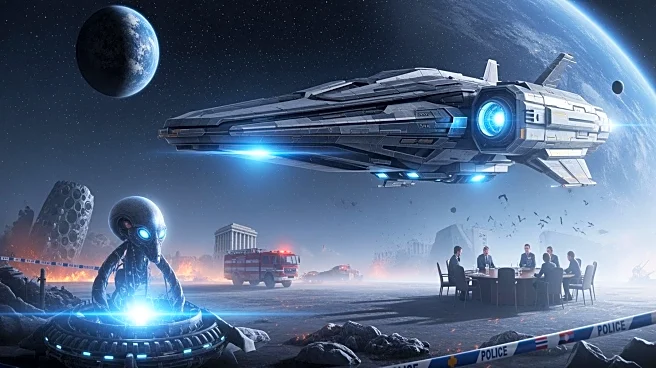What's Happening?
Leonard Boyarsky, a key figure in the development of The Outer Worlds 2, revealed that the game almost included a complex 'evil ending' similar to Caesar's Legion from Fallout: New Vegas. However, this
path was ultimately cut due to the extensive effort required and the limited payoff. The game was intended to feature intricate faction dynamics, allowing players to side with different groups, including the Protectorate, a collectivist surveillance state. Despite initial plans, the Protectorate's role was reduced, and the game focused on other factions due to time and budget constraints.
Why It's Important?
The decision to streamline The Outer Worlds 2's narrative reflects broader challenges in game development, where creative ambitions must be balanced with practical limitations. This highlights the complexities involved in creating reactive and immersive gaming experiences, which are highly valued by players. The reduction of the Protectorate's role may impact player engagement and the game's reception, as fans often appreciate diverse narrative paths and moral choices. The development process also underscores the stress and decision-making involved in producing high-quality games, influencing future projects and industry standards.
What's Next?
As The Outer Worlds 2 approaches its release, Obsidian Entertainment may face scrutiny from fans eager for expansive narrative options. The company might consider post-launch updates or expansions to address player feedback and enhance the game's depth. Additionally, the development experience could inform Obsidian's approach to future projects, potentially leading to more streamlined production processes or innovative storytelling techniques. The game's reception will likely influence the studio's reputation and its ability to attract talent and investment for upcoming titles.
Beyond the Headlines
The development challenges faced by The Outer Worlds 2 may prompt discussions about the sustainability of ambitious game projects and the mental health of developers. The industry's focus on delivering complex narratives and player agency can lead to significant stress, highlighting the need for supportive work environments and realistic project scopes. This situation may also encourage a reevaluation of consumer expectations, fostering appreciation for the creative efforts behind game development and the trade-offs necessary to deliver polished experiences.









